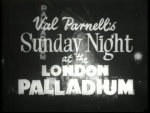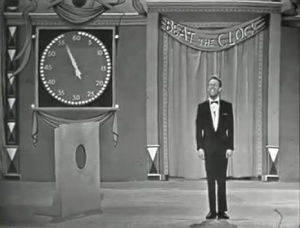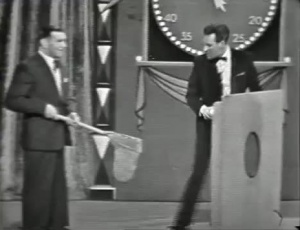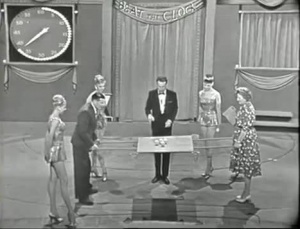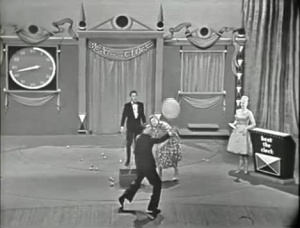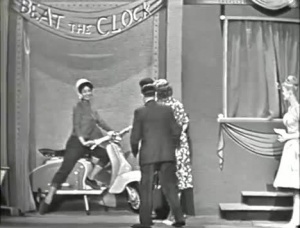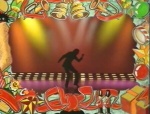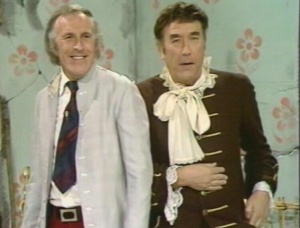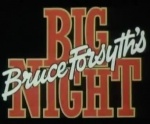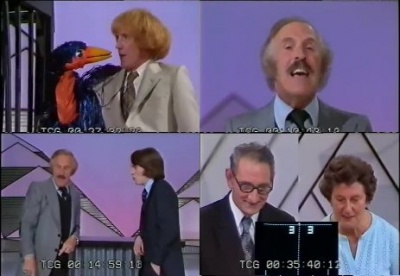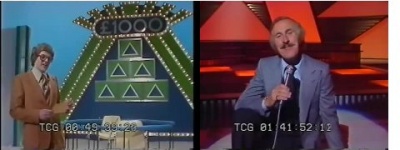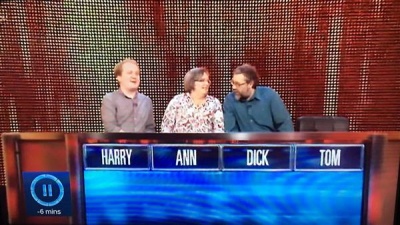Weaver's Week 2016-11-06
Last week | Weaver's Week Index | Next week
Television marked its 80th birthday this week. It's an excuse to chart the biography of an early television star.
Contents |
The Life and Career of Bruce Forsyth
Part 1: birth to 1978
Bruce Joseph Forsyth-Johnson was born on 22 February 1928. He is the son of John Thomas Forsyth-Johnson and his wife, born Florence Ada Pocknell. Both his parents played brass in the Salvation Army band, and Florence was a singer.
The young Bruce went to the Latymer School, and trained in dance after seeing Fred Astaire in films. He made his television debut in 1939, on a show for young entertainers. He promised to become a star and to buy his mother a fur coat. History does not record whether Florence Forsyth-Johnson received that gift.
After leaving school in 1942, "Boy Bruce The Mighty Atom" appeared at the Theatre Royal in Bilston {1}, and he continued to entertain for the duration of the war. He spent the late 1940s and 1950s on the music hall circuit, doing variety shows and pantomimes and summer seasons. Bruce's most famous trick was his strong-man act, and he met his first wife while at the Windmill Theatre.
Bruce appeared at the Royal Variety Show in 1958, a "young comedian in his twenties" alongside Roy Castle and Ron Parry {2}. He played in the Palladium pantomime, "a debonair clown" according to reviews of the time, used as punctuation when the show needed to breathe. The Variety Club named Bruce as their Independent Television Personality of 1959.
The Palladium, and Beat the Clock
Bruce came to the attention of Val Parnell, whose Sunday Night at the London Palladium was television's top gig. He performed on the show, and quickly became its host. We've watched a sample show from April 1960.
Looking back at the show, we can see it's a relic of a bygone era. The episode opens with The John Tiller Girls, a chorus line of dancing girls, selected as much for the length of their legs as for their dancing talent. (It is difficult to dance in high heels, and we don't know how the chorus managed it.) Then Bruce steps up, and gives a monologue of jokes, many at the expense of the orchestra conductor Cyril Ornadel.
Our first guest act is The Dior Dancers, another dance troupe, many athletic men and one lady. She's the object of their performance, used as an ornament, then thrust up above the men's heads, and finally used as a skipping rope. The athleticism astounds us. So does the rampant sexism: everything is being done to the woman, she has no agency of her own.
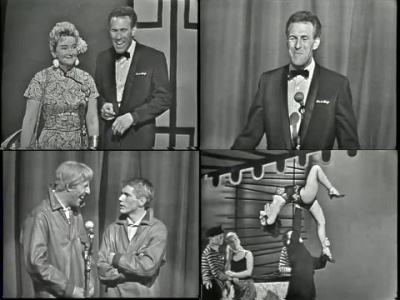 Top: Beryl Reid with Bruce, and Bruce Forsyth solo.
Top: Beryl Reid with Bruce, and Bruce Forsyth solo.
Bottom: Bruce with Adam Faith, and the Dior dancers perform.
Then we have a comedy turn with Beryl Reid, during which Bruce plays her stooge. Throughout his career, Bruce knows who is the real star of this moment – sometimes it's him, and sometimes it's not. Bruce's apparent ego always trod the line between genuine and being for show.
There's an opera performance from Rise Stevens, and the show finishes with "the new noise" of The John Barry Seven performing "Hit or Miss", the theme from Juke Box Jury. They're joined by Adam Faith. He was the young and fresh pop star of the era, the Zara Larsson of his day. Faith's act closes with an intervention from Bruce, wearing a wig and outfit to look like the bigger star.
Before Adam Faith came a challenge element, Beat the Clock. This segment had grown out of necessity. Back in the 1950s, religion was enshrined in law. It was not permitted to wear costumes or use scenery. Even at a holiday camp, these rules applied. To entertain the crowd, Bruce and his yellowcoats played simple challenges with the audience. These challenges formed the base of Beat the Clock.
In our sample episode, Sophie is to bounce tennis balls on the floor, through a hole, then Bill is to catch the ball in a fishing net before it bounces again. Three balls caught in 55 seconds wins the prize.
Sounds difficult, and looks difficult. Sophie takes forever to get her eye in, many of the balls bounce just a little too high. But then one goes through, and Bill catches it. Time is marked by a big clock on the studio wall, and a ticking each second.
Bruce Forsyth keeps up a sparse commentary, and offers advice to Sophie – throw a little further, bounce a little lower. But when he has nothing to say, Bruce keeps quiet, lets the pictures tell their own story. Bill catches his first three balls, and wins the prize.
Straight away, we move to the jackpot round. They have a light plank of wood, with small pockets on each corner. They hold the plank by sticks from the long ends. There are no walls to the plank, just sheer drops. The object is to put a tennis ball into each corner, in order. 40 seconds to put the balls in.
This looks impossible. But light movements will pay off. They get ball one in. They get ball two in. "Easy now, don't be impatient", and ball three falls into place. With a few seconds, there's just one shot at getting ball four into the right place. Tilt, move, tilt – and they tilt too far, the ball falls, and the challenge is lost.
That was edge-of-the-seat stuff! "Goodness gracious, that was the nearest thing I've ever seen." Bruce and his team have managed to turn a simple challenge into gripping television.
A slight comedown for the next game, Bill and Sophie are to keep a balloon in the air. Bill takes one pat, then Sophie the next. And there are some Easter eggs on the floor, the contestants are to clear the stage and put all the eggs in the box.
After the high drama of the jackpot game, this is a lot lighter. So much lighter that the rules are quietly ignored, it makes better television. On this show, the emphasis is on entertainment.
And finally, the word game. Sophie is shown about eight words that can be arranged to form a well-known phrase. We'd know it as fridge magnet poetry. This game didn't work on television, we didn't get a good look at the words before Sophie started moving them and couldn't see through her.
All of this has filled five minutes: two party tricks that could still work today (enlarge them a bit as two-player games at The Crystal Maze, hint.) One game was for laughs, and one that fills a few moments. What have Bill and Sophie won? Very nice, a motor scooter worth about £200.
After leaving Sunday Night at the Palladium, Bruce returned to the theatre. It was still possible to make a good living from theatre tours, variety was not dead yet. Stage and screen occupied him for much of the 1960s, shows like Little Me where he played seven roles. Bruce often appeared on television. He was compère of the 1962 Royal Variety Performance, and Bruce's Show went out on ITV in autumn 1962.
Bruce gave a light entertainment show on BBC2 for Christmas Eve 1965, and one on ITV for Christmas Day 1965. A series of light farce comedies ran on ITV during summers from 1966 to 1969, networked at 10pm on Sunday nights. He turned up on ITV's Piccadilly Palace variety programme in 1968, The Times noted how he "injected a bit of life into some dreadfully limp comedy sketches". Bruce also made occasional programmes for BBC2. He had a short film career, including a brief cameo in Bedknobs and Broomsticks.
"Whatever happened to Christmas" asked Bruce for Christmas 1968, a show he made with Cliff Richard for ITV on Christmas Eve. But most of the late 1960s were spent in theatre, with a regular late-night show at the Talk of the Town theatre. His theatre career continued into the 1970s, increasingly with nostalgia shows.
Bruce Forsyth and The Generation Game
Theatre work dried up, and Bruce returned to television. He hosted The Generation Game, a light-hearted contest between relations of different generations. Light-hearted challenges to identify celebrity snowmen, or make a Christmas cracker.
We reviewed the Christmas 1973 edition some years ago. These were our conclusions:
- Why does this show work? Bruce has created an environment where we know what should happen, and where what should happen is funny in itself. The professionals have started us laughing, and Bruce is able to keep the laughter rolling. He has no care for the fourth wall: these are amateurs, hamming it up and quite clearly having the most wonderful time. "Frankie [Howaerd] will be furious, he's better than 'im!" says Bruce of one contestant. He's not just knocking a hole in the separation between actor and audience, he's helping to blow it down with gales of laughter.
- The Christmas episode was always going to be seen by something like half the country, and it was a joy to see from start to finish. Part of The Generation Game's charm was that it never lost sight of the reason why people were watching: they wanted to see other viewers, people they could empathise with, doing extraordinarily silly things. The contestants were the focus of the show throughout. There was nothing outside the studio, and the show looked like it was shot in real time, fluffs and all. It's television that felt real.
Bruce spent seven years with The Generation Game, and became a massive star. The Variety Club named Bruce as their Television Personality of 1975 {3}. He was part of the Christmas 1977 schedule. The Generation Game, then Morecambe and Wise, then Mike Yarwood.
Christmas 1977 was an odd one. In early December, the advertisers' lobby group Media Circle urged ITV to "pull its socks up" and challenge the BBC. The BBC put out the more popular slate of programmes, as they had done for a number of years. Channel bosses were worried. They might not get big bonuses, and penury might reduce them to doubles all round. ITV resolved that Something Must Be Done.
ITV is known for its forward-looking schedule, and the commercial channel brought over many stars of the future. Prospects included Vera Lynn, Max Bygraves, Ken Dodd, Arthur Lowe, and Ned Sherrin. Its drama was similarly progressive, subjects such as Edward and Mrs Simpson, Lillie Langtrey, and Disraeli.
But it wasn't just new talent, ITV got out its big fat cheque book and waved it around on some established stars. Morecambe and Wise left the BBC for Thames, but the deal didn't include their writer Eddie Brabin. Bruce Forsyth would follow, signing first for a West End musical, and when that flopped he went to London Weekend Television. Bruce had crossed the channel as often as a ferry; this particular transfer caught the zeitgeist.
The immediate result:
Bruce Forsyth's Big Night
In the late 1970s, ITV was made up of regional companies. They put out the programmes they thought best suited for their region. Some of the more esoteric and unpopular programmes, like University Challenge, could go out anywhere in the week. Some of the imported shows, like westerns, would be shown in June on Granada in the north-west, but not until January on Yorkshire.
BBC1 didn't have this problem (except for viewers in Wales, who had to have hours of Welsh-language programmes each week.) Was a common schedule across all the companies going to be the key to success? They agreed to show Bruce Forsyth's Big Night at the same time on all the regions, so everyone could enjoy a common experience. Bruce spent two minutes cheering how this show is going out in the same time across all regions, as though it were something uncommon. In fact, most of prime-time was network television, Bruce is literally making a song and dance about an everyday occurrence.
The real problem: ITV made rubbish light entertainment. We've watched the first episode, all 100 minutes of it. An introduction routine from Thirty Two Steps is glamorous disco, shot on a disco floor with lights underneath it. We won't see the dance troupe again until the closing credits.
After that song about ITV, Bruce then delivers a comedy monologue about potential show titles. And he praises the success of Yorkshire's 3-2-1. "Hasn't that caught on?" he asks. Ted Rogers and Dusty Bin were making a name for themselves on Friday nights. Bruce should watch out, they will steal your slot next year.
Anthea comes on to demonstrate her dress. She was a hostess on The Generation Game, married Bruce, and followed him to the commercial channel. Bruce also introduces the hostesses, Michelle and Di. Surnames for women, at this early date, had not yet been invented.
After almost eight minutes of faffing about, we're into the first feature proper. It's a competition to tell a funny joke; three young comedians come on stage and perform a shaggy dog story, with Bruce egging them on. Scores are delivered by five anonymous members of the audience sat in the theatre's upper circle, and the winner gets a mask of the theatrical comedy face. This feature drags on far too long – it took forever to deliver three mediocre jokes and one prize.
Next, something far more entertaining, Rod Hull and Emu.{4} The bird pretends to be hypnotised, and ends up entering a "protective" jail cell to attack Bruce. Well done, Emu. Then comes some Random Dancing, the finalists in the First United Kingdom Disco Dancing Championships. They'll be whittled down from 42 to 15 by professional dancers and DJs, before viewers at home get to select the winner. Which dancer has the X factor?
What's next? Telly tennis. A high-tech cutting edge computer game you can play on your television. Except this is 1978, and "high-tech" graphics are white lines travelling up and down, with a small dot moving about the screen. Not so much "go 8-bit" as "go 2-bit".
Normally, the controller was a knob you'd twirl in your hands. Here, it's a microphone that you talk into. Bruce and Anthea demonstrate how it works, and how not to play it. Then they have a couple of people from out of the audience to play the game.
While chatting to contestant Cyril, they talk about his mother. Maude is 95, and she's been a fan of Bruce all her life. Even at this early date, there were jokes about Bruce Forsyth being a showbiz veteran. In 2016, Bruce is such a veteran that even jokes about his age generate nostalgia.
Only now, after 32 minutes, do we get a commercial break. Thirty-two minutes before the adverts! Maybe this explains why ITV wasn't doing so well.
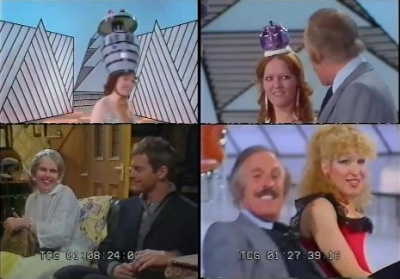 Top: Miss Post Office Tower, Miss Tea Party.
Top: Miss Post Office Tower, Miss Tea Party.
Bottom: Eth and Ron from The Glums, Bruce with Bette Midler.
After the break, a fancy dress parade, including one contestant who has come dressed as the Post Office Tower, and another with a teapot on her head. Bruce gets to run through a bunch of one-liners, and all the contestants do a stunt for their minute of fame. The audience cheer-o-meter determines the winner.
Then it's Steve Jones with The Pyramid Game. A mini show within the show, Steve offers a ten-minute entertainment. Two rounds each, and the winner goes to the middle to win £1000. In later years, The Pyramid Game was spun out to a full half-hour show. Tonight, Liza Goddard and her contestant sweep the early rounds, but fall short on the big prize board. Russell Harty is the other celeb. Two very decent bookings, like Sara Cox and Matt Baker these days.
The second half of the show was denuded of game content, and they didn't have time for the Cannon & Ball sketches. Part three was a revival of The Glums, a radio comedy from the 1950s. In part four, Bette Midler gave a performance and an interview. Bruce offered the nice Jewish girl a pork pie, and Bette apologised for missing the Queen's jubilee last year. Don't worry, Bette, it's the first in a series, and Bruce will be at all of them. Bette finishes with a few more songs, and for the last she's joined by Bruce. At least he's stopped wearing a matching wig and outfit to look like the bigger star.
We can see why Big Night didn't take off. It all felt a bit disjointed, like a bundle of parts thrown together. We remember Ant and Dec's Slap Bang being funny in episode one, amusing when episode two was the same thing again, and turn-off dull by episode four.
Same problem here. Next week, we're promised Elton John, Charlie Drake, and Pam Ayres, but more joke-telling and fancy-dress. Behind the scenes, the director was unhappy, and would resign after the second episode. He wanted to be a television director, not a traffic warden, and this stress showed on screen. Late in the series, Bruce addressed the criticism on air, and pleaded for more time. This complex format was too much for LWT.
Making things worse, Saturday already had successful free-form entertainment programmes. Swap Shop was never slick, but it had as many big names as Bruce's show, and it felt like a coherent programme. Tiswas also had star guests and an internal logic, albeit one predicated on custard pies. At the time, Bruce was shown the way forward by children's telly. In retrospect, it's no shame to be upstaged by Noel Edmonds and Chris Tarrant.
The Generation Game had survived Bruce's exit, and was now hosted by Larry Grayson. His series had begun two weeks earlier, and already the telly critics thought he was making a good mark on the show. Big Night began at 7.25, fifteen minutes before Grayson finished. It ran on to 9.15, against feelgood drama All Creatures Great and Small and the entertainment Little and Large. An unfunny joke opposite the conveyor belt game? A gentle story of a vet against Miss Murky Duckpond and a 1950s script? We know where our set is tuned.
Bruce Forsyth went away and had a think. What can he do next? And can it be more simple than Big Night? Something he can do with one hand tied behind his back, blindfolded, standing on one leg, and playing bridge at the same time.
{1} The Theatre Royal closed in 1957, and was demolished in 1961. The site is now the Gurdwara Bada Wadbhag Singh. Back to article
{2} Roy Castle of Record Breakers fame. Ron Parry appears to have achieved less television success, and retired to Australia. Back to article
{3} Remember the award he took in 1959? That was just for independent television. Back to article
{4} As popular as Mr Blobby, and just as annoying. Back to article
Countdown Update
Since the end of September, Countdown has had some interesting matches. Chris Sinclair had two wins, Lucy Westwood and Ikenna Oguguo one win each. Jamie Smith won four games, and looked to be a strong player. But he was knocked off 77-76 by Andrew Macleod, who went on to win eight games (total 809 points). Andrew looks to be a solid performer.
Elesh Mistry won two games, Daniel Clerkson one, Mick Groarke two. Rik Anstee has six wins to his name so far, but hasn't registered a century score.
It's been a quiet series so far, the first time in four years where no-one's notched up 850 points in their heats. It gives hope for those of us who watch for fun.
This Week and Next
Friday's lineup on The Chase raised some eyebrows. Harry, Anne, Dick, and Tom? But they play from right-to-left...
Happy new year to Round Britain Quiz, this week featuring a toolbox of popular song.
University Challenge completed its repêchage matches, SOAS beat Durham by 270-85. As one-sided as it sounded, SOAS look like a team that could buzz anyone else out of the tournament.
Last of the repêchage matches on Only Connect, the Wrestlers against the Genealogists. We could tell from the start that the Wrestlers would win: in their heat, they won the toss and selected, while the Genealogists were put into bat.
"I don't think a tomato has ever been the head of the Supreme Court". Not quite a Hidden Transmission Indicator, that appointment comes during the Group Stage. A question on spin-offs from reality shows, but surely The Voice is remembered for Hacker and Dodge Barkstage. It's got Hacker and Dodge in it! The Genealogists had a good lead after connections, 8-4. It increases to 13-5 after Sequences, helped by the Wrestlers thinking a 50p piece has 8 sides.
Genealogists took the win on the wall, extending the gap to 11 points. A loose offer of "Beethoven symphonies" was disallowed – the group was sonatas, and that cost the Wrestlers three points. The Wrestlers won Missing Vowels by 9-0, but it wasn't quite enough. Genealogists scrape a win by 23-21, and they'll be dancing to the Moonlight Sonata in Cardiff tonight.
Only Connect is honest that it's split into two halves at this stage, so we're back to Section A for the first four second-round matches. These are straight knockout, defeated sides are eliminated.
Prime defeated Logophiles by a single point on Hive Minds. It was one of those shows where points are hard to come by, and the Logophiles' superhive of Irish counties was a rare high point. Hive Minds has a good idea at heart, but we don't get much out of this execution.
Isabelle Heward won this week's episode of Mastermind. The Scunthorpe Scholar from Hive Minds took Rita Hayworth as her specialist, and registered 26 (0 passes) in the two rounds. The contender has qualified from four of her five heats, but has yet to make a series final. Barry Devine (Hans Christian Andersen) and Nathan Jones (Russian civil war of 1917; a perfect specialist round) both made 22 points. Phil Boor (Ipswich Town FC) finished fourth.
BARB ratings in the week to 23 October.
- Semi-final week for Bake Off, and 13.45m see Selasi chillin'.
- Strictly Come Dancing has 11.2m viewers, and The Apprentice 7.35m.
- Wither The X Factor? 7m for the results show, 6.8m for the performances. That's behind all editions of Coronation Street and Emmerdale Farm.
- Of the rest, 5m for HIGNFY, 4.8m Pointless Celebs, 4.15m Who Dares Wins. The Chase brought 3.05m to ITV.
- Bake Off An Extra Slice had 2.95m on Friday, UC 2.9m, Only Connect 2.8m. Pointless moved to BBC2 on Monday, with 2m viewers. Eggheads followed directly, with 1.75m – that's up 600,000 on the recent average.
- Catsdown on Channel 4 had 1.45m. Celeb Juice (ITV2) had 1.24m, A League of Their Own (The Satellite Channel) 745,000, but we have no figures for Taskmaster on Dave.
The Next Great Magician (ITV, Sunday) has Stephen Mulhern and Rochelle Humes finding exactly that. There's a new run of Sion a Sian (S4C, Friday). Paul Sinha and Stuart Maconie join the panels on Round Britain Quiz (Radio 4, Monday).
Foodies will enjoy Junior Bake Off (CBBC, weekdays) with Sam and Mark, and Masterchef The Professionals (BBC2, from Tuesday). Last in the series of My Kitchen Rules (C4, weekdays).
Photo credits: ATV, BBC, LWT, Potato (an ITV Studios company)
To have Weaver's Week emailed to you on publication day, receive our exclusive TV roundup of the game shows in the week ahead, and chat to other ukgameshows.com readers, sign up to our Yahoo! Group.


